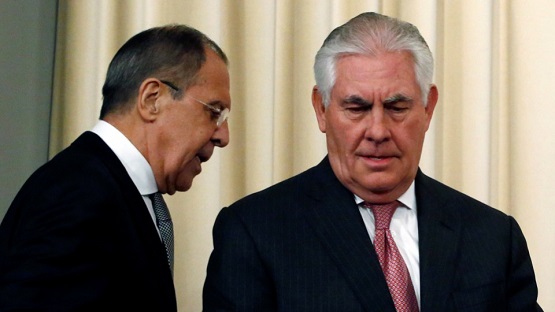Russia-US ties hit a new low after Moscow has told Washington to cut the number of its diplomats in response to the approval by the US Congress of new sanctions against the European country.
The Russian Foreign Ministry said on Friday that the US had to reduce the number of its diplomats on Russian soil to 455 - matching the number of Russian diplomats in America - by September 1.
The Russian side is suspending the use of all storage facilities on Dorozhnaya Street in Moscow, and a cottage in Serebryaniy Bor by the US Embassy in Russia as of August 1, the ministry further said.
Russian President Vladimir Putin had approved the move, according to his spokesman, Dmitry Peskov.
The US ambassador to Russia has condemned Moscow's retaliatory measures, and expressed his strong disappointment and protest, at Kremlin's decision to reduce the number of US diplomats in Russia to 455 (from 1100) by September 1, as cited by Russian news agencies and Western media.
However, Russia seems to be determent in its decision as Deputy Foreign Minister Sergey Ryabkov says they don't rule out any steps to bring the US to its senses, has said.
We are not ruling out any steps, so to say, to bring to their senses those presumptuous Russophobes who are setting the tone on Capitol Hill today, Ryabkov told reporters.
Ryabkov also warned that the retaliatory measures are not limited to the reduction of US diplomatic personnel and the seizure of diplomatic property.
We cannot put up with Russophobic mayhem on Capitol Hill, which was expressed in the adoption of an unprecedentedly far-reaching document in both chambers, Ryabkov told RT.
We believe that our American colleagues had enough time to weigh up the potentially destructive consequences of such actions, he added.
Russian Senator Aleksey Pushkov said that the retaliatory steps had been looming for a long time, but that Moscow hoped relations with the US administration would improve.
The retaliatory measures to the expulsion of our diplomats and the arrest of our diplomatic property in the United States have been brewing for a long time, specifically since December. They were not taken only because there was hope that the relations with the Trump administration would become better. Not to spoil the prospect, the Russian leadership refrained from imposing retaliatory measures, Pushkov told RT.
He added that the US president seems to have little choice but to approve the Senate sanctions, as if he tries to veto the bill, the decision will be overturned by US lawmakers.
An American election and a diplomatic war with Russia
The former US administration, headed by Democratic Barack Obama, had expelled 35 Russian diplomats over spying and seized two diplomatic premises used by Russia late last year amid allegations that Moscow interfered in the US presidential election in November 2016, in which Republican Donald Trump won the presidency.
The Russian Federation's riverfront compound is seen from the water on Maryland's Eastern Shore in Centreville, Maryland, June 16, 2017. That building, along with another, has been seized by the United States. (Photo by AFP)
Russia complained about the move but had withheld retaliation until now, hoping that relations would improve with the US under its new president - Trump.
But while Trump himself has been perceived as open toward warmer relations with Russia, the US Congress took action to punish Moscow for the alleged interference in the 2016 election.
There have been claims that Russia attempted to sway the election in favor of Trump by hacking computers belonging to his rival's campaign and dumping potentially compromising information online.
Russia has consistently denied the accusations of meddling, and had in the meantime been warning that the US had to return the diplomatic premises. Moscow recently engaged in negotiation with the US to have the premises returned but to no avail. On July 14, Russia said it was running out of patience as a stalemate lingered over the issue.
Handcuffing Trump at the Congress
But the US Congress' approval of new anti-Russia sanctions on Thursday seemed to be the boiling point for Moscow.
The sanctions bill was overwhelmingly approved by the Senate on Thursday. It had been approved also overwhelmingly by the US House of Representatives earlier on Tuesday.
President Trump will now have to decide whether to sign it into law or veto it.
The bill puts Trump in a bind over the potential lifting of any sanctions on Russia - a traditionally presidential decision - by stipulating that the Congress would have to approve any such lifting before it can take place.
An independent investigation is meanwhile underway in the US to probe potential links between Trump and Russia.
LINK: https://www.ansarpress.com/english/7725
TAGS:































 online news tv
online news tv




